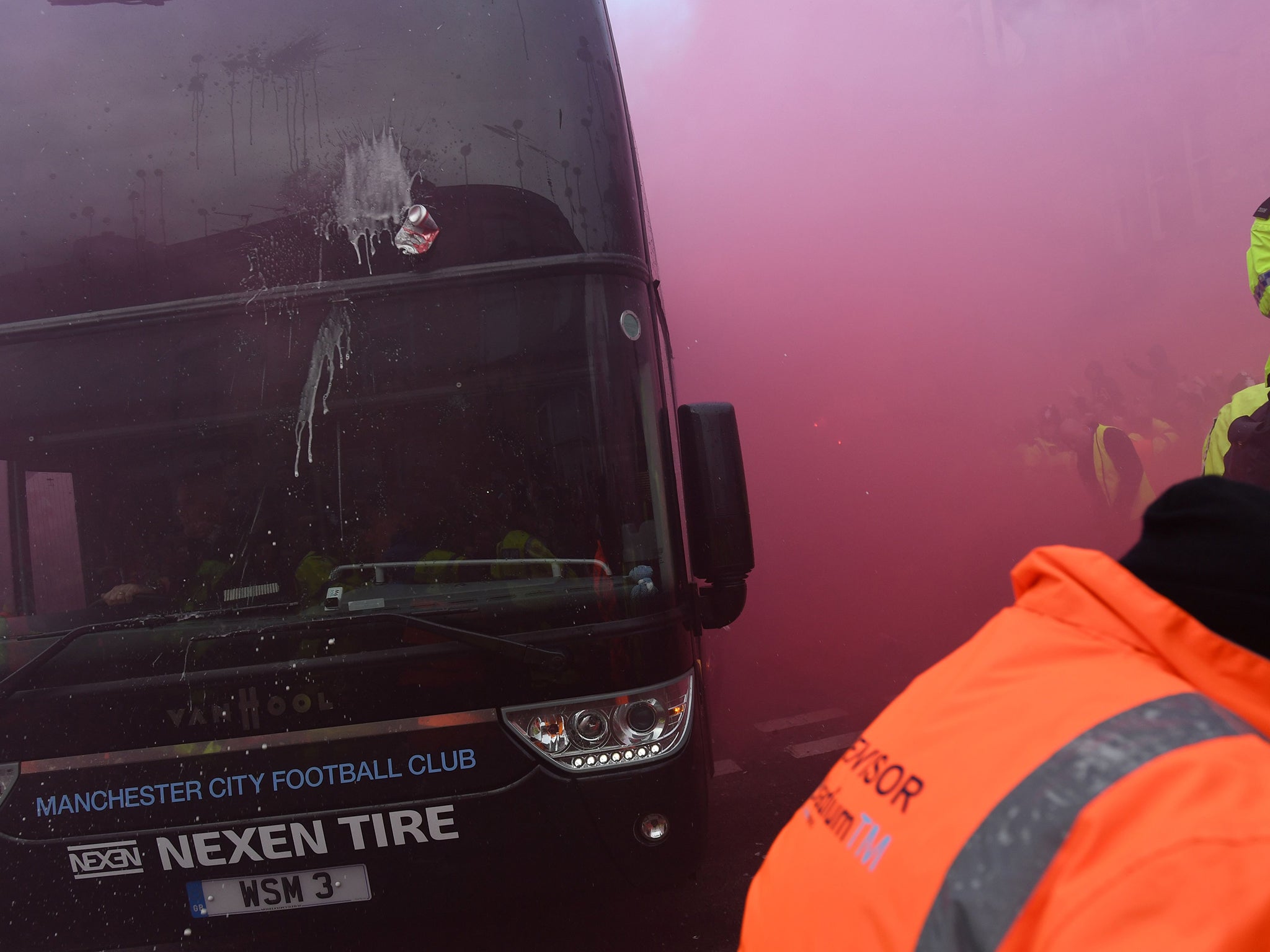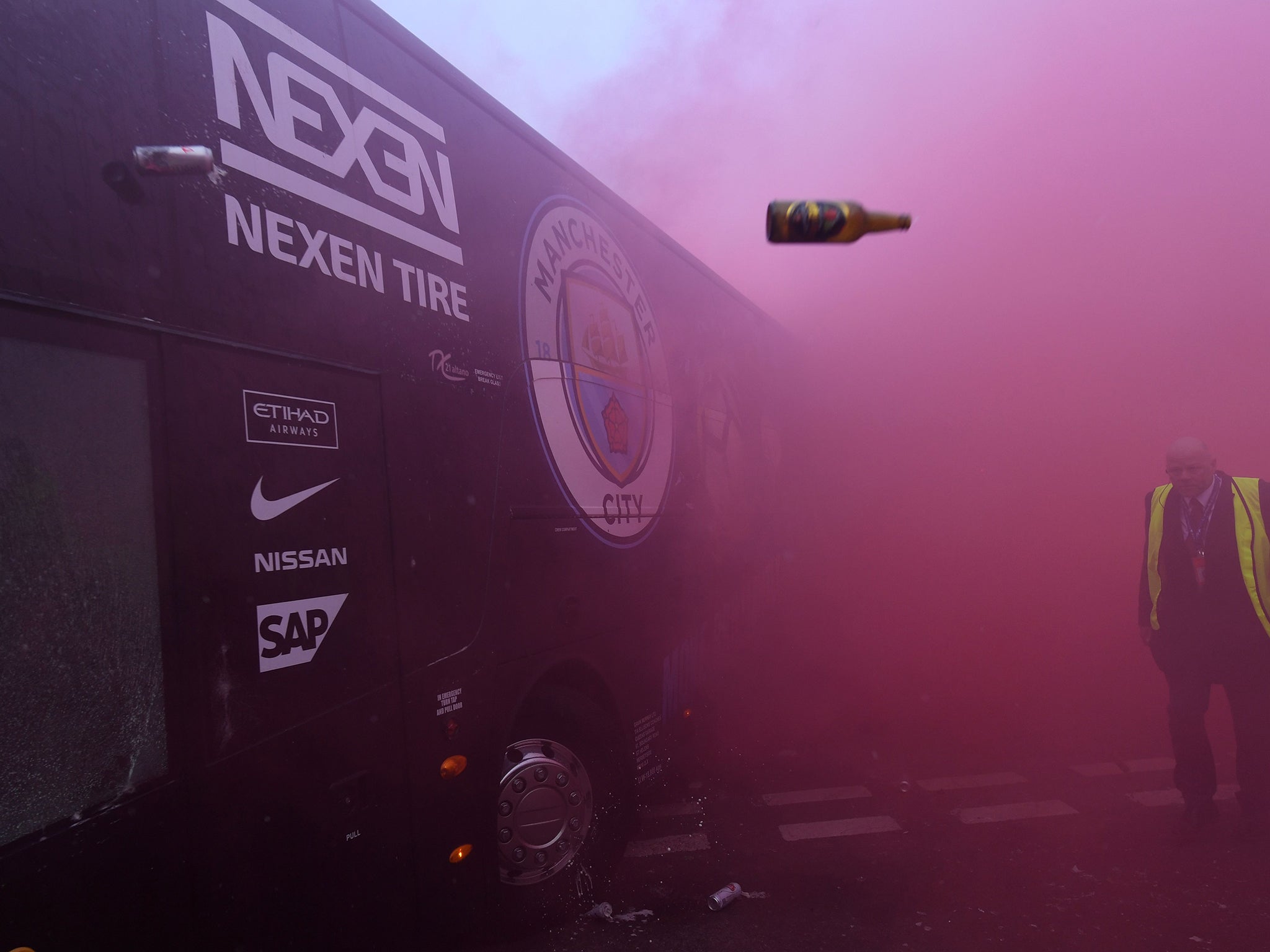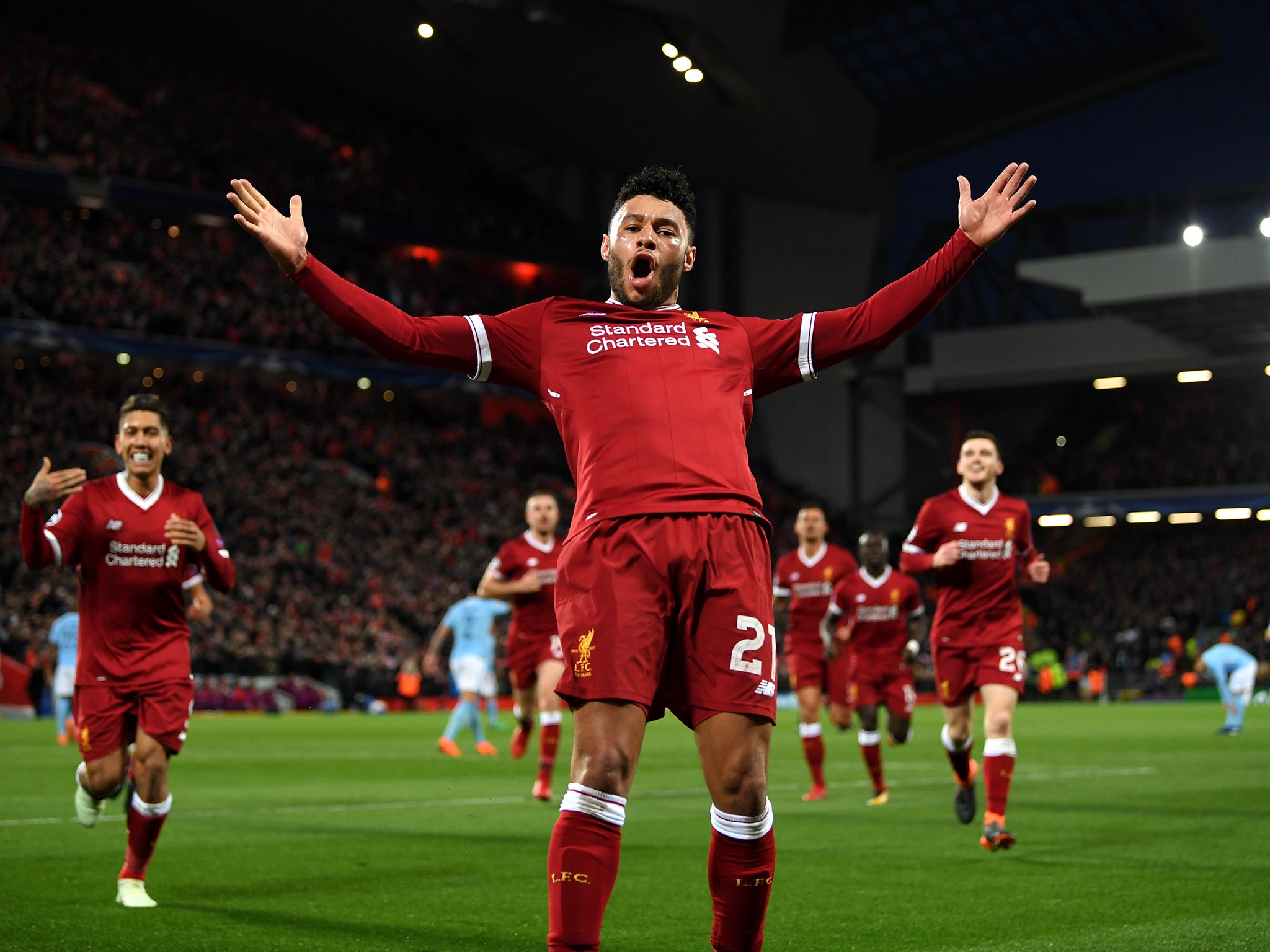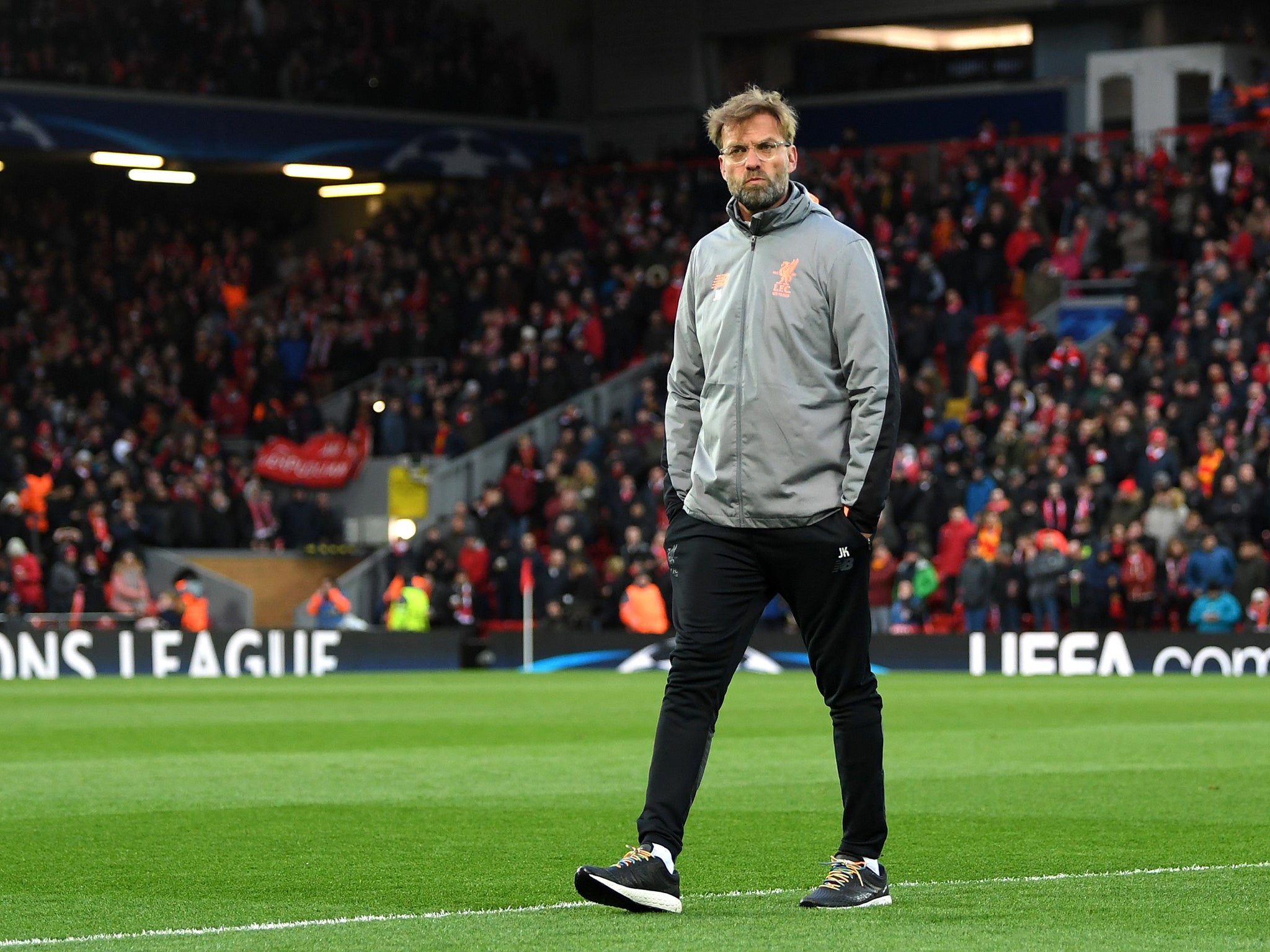Anfield feels impenetrable when Liverpool play this way. Try not imagine what an alternative world would be like
The scenes before, during and after the 3-0 victory over Manchester City may have been viewed as too much or too dangerous by shire Briton, but then Liverpool is not shire Briton
The noise travelled up the road like thunder, the colour like fire, the red smoke like a Varanasi pyre. It seemed as though the bus was burning.
Until you understand the geography of the area, it might have seemed an odd decision for Merseyside Police to pre-warn supporters of where to be or, indeed, where not to be when Liverpool’s opponents arrived for the club’s most important European game in a decade.
Manchester City were coming from a different direction than usual, via land rather than from out towards the Mersey river; a passage perhaps not quite as atmospheric but certainly not as warrenous as the normal one for every home fixture. There are fewer scaffolds, fewer terraced houses – fewer places to perch, fewer places to get hurt from falling. It seemed like the safest option to take: to avoid a surprise and avoid a mass surge of humanity, to allow the police to take their positions and arrange crowd control barriers.
Yet still, from the entrance to the ground right by where the old Shankly Gates used to be, the noise, the colour and the smoke came. The sudden sound of a police helicopter’s wings cutting through the sky was a sign that City were here. Beer cans were thrown. There was the sound of glass hitting steel. It resulted with Liverpool “apologising unreservedly” in a statement released ten minutes before the kick-off. City officials claimed that in total, 13 coach windows were shattered on the approach to the ground.


For some visiting players, in these moments, they must know what it is like for high profile criminals when they approach court caged in wagons. Others will remember what it was like starting out in Buenos Aires or São Paulo and be able to identify with the sort of chaotic scenes that many shire Britons consider too to be at best too much or, instead, simply too dangerous. Liverpool prides itself on not being shire Briton. It is fine with being a mad house.
City, remember, had gone to Naples in November – supposedly the Liverpool of Italy – and won there convincingly, 4-2. Liverpool’s progression to this stage had posed fewer challenges than City’s but then, Liverpool’s long journey to this point mirrors football itself when you assess the fundamental changes to the way the game is approached tactically by managers and consumed by even those with a passing interest since they were last in the quarter-finals of the Champions League nine years ago.
This had been an era which had begun with former Real Madrid coach and World Cup winner Jorge Valdano attacking Rafael Benítez and Jose Mourinho, for ushering in a bleak future, saying in 2005, that “Anfield is unbeatable,” reminding that it didn’t really matter how Liverpool played, so long as they had a chance of winning.
“Put a s*** hanging from a stick in the middle of this passionate, crazy stadium and there are people who will tell you it’s a work of art,” Valdano bristled. “It’s not: it’s a s*** hanging from a stick.”

Valdano had complained then there were none of the skills on display last night: short passes, feints, changes of pace, one-twos, nutmegs and backheels: the sort of things that can get a crowd purring but not always boiling. As Valdano said, it does not particularly matter at Anfield, a venue that wins points when belligerence exists; where Liverpool have won so many times against more talented opponents through sheer force of will. If Liverpool have a chance, its people believe in the team and when there is momentum and someone to loathe because of rightly or wrongly whinging about what might happen if the reception they get is too hot, the outcome is this: a pushback that can reduce apparent superheroes to plankton.
When Mohamed Salah scored the opening goal, a cup of indeterminable liquid landed in the press box in the wild celebrations. When Alex Oxlade-Chamberlain blasted in a second, the ground shook to its ancient foundations. When Sadio Mané added a third inside 31 minutes, well that unleashed bedlam. In the heat of the blitz, many of City’s international standard players – world class players – blacked out. Liverpool, Anfield and indeed Merseyside had been too much.
City regained some composure but Anfield remained edgy. It has become a cliché but that doesn’t render the statement void: under the lights, when Liverpool are emerging as a force as they are now, the stadium’s magic is true and irresistible.

It explains why there remains a need to acknowledge the ongoing battle between those that create the spectacle the most, and those that want to capitalise on it in a financial sense – regardless of whatever reason they give to justify the pursuit, which reliably falls on the monetary implications that arrive, thus facilitating the supposed improvement of the team.
At Liverpool’s city centre Chapel Street offices, there are businessmen with spreadsheets on their computers that detail the expected yield per seat inside Anfield. What that means in basic terms is, how much money the club can make from the people that watches the team at home games. The money made by Liverpool stays in the club’s coffers and is not spread across Fenway Sports Group’s other projects. And yet, it sometimes feels Fenway take it too far when exploring how much they can, using venture capitalist language, “monetise the asset.”
Though it was later removed, on Tuesday night – through the club’s official Twitter handle – it had been announced that fans in the new Main Stand’s low levels could order food to be delivered to their seat, in what was described as a “trial.” Perhaps the decision was taken to “trial” it now because the narrative around the game owed so much to how febrile the atmosphere was going to be anyway.
Liverpool, more than any other major British club, has toiled with this sort of commercial intrusion since the glory days. In 1995 when a McDonalds was introduced to the Kop and a Golden Arches spot welded beneath the famous stand, there was uproar. Surely, though, it would infuriate Jürgen Klopp if he knew Liverpool were trialling anything in any part of the ground when the reward is the Champions League semi-final. Surely, he would argue that the club’s entire focus should be on sealing victory, which inevitably would be made a bit more possible with everyone present focused absolutely on what is happening on the pitch rather than fiddling around with their mobile phones ordering junk food while arguably the most compelling sports event of the year takes place just in front of them.

You can say it is a little bit like following baseball’s path but you cannot say it is like the Bundesliga in terms of fan experience unless ticket prices come down.
Inevitably, conversations like this in the pub will end up going if the scheme is ramped out and repeated elsewhere: “What did you think that moment when Salah waltzed past Aymeric Laporte like he wasn’t there?
“Don’t know, I wasn’t really there either; someone serving a hotdog and a large Fanta to the lad sitting next to me was standing in the way…”
If you want to know about how focused Liverpool need to be as a club in order to achieve success and ensure it carries on, it is worth sometimes remembering how they once got there. Paul Moran the son of the late Ronnie Moran – Liverpool’s legendary coach – reacted on Tuesday with a degree of amusement. If Paul views it this way, you can guarantee Ronnie and the rest of the Boot Room would as well.
“Always remember being annoyed just before Davie Fairclough’s goal against St Etienne in 1977 that there was no method of ordering a pizza to be delivered to my seat,” Paul replied. “Luckily, Davie scored and everyone was happy.”
The trial, of course, would never have explained a bad result for Liverpool here, yet critically it would never feature in a list of reasons why they were able to win.
It does make you wonder which other ingenious concepts they’d come up with if Liverpool end up getting through the second leg of this tie. Imagine if they actually win the trophy.
Join our commenting forum
Join thought-provoking conversations, follow other Independent readers and see their replies
Comments
Bookmark popover
Removed from bookmarks